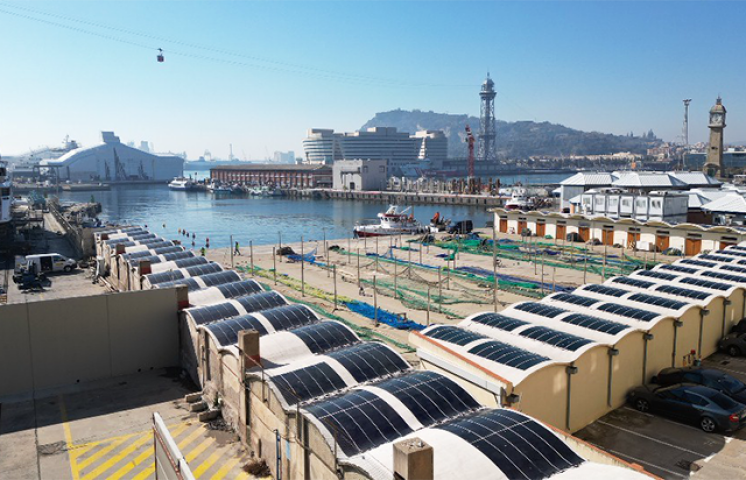Rolling out flexible and self-adhesive solar films in the port of Barcelona

Installed on the Moll des Pescadores, it is part of the LIVE BIVP (Building-Integrated Photovoltaics) project, co-financed by the European LIFE programme. Its goal is to develop solutions for integrating photovoltaic modules into buildings so as to boost their production of renewable energy.
Heliatek is one of the world leaders in organic photovoltaic technology and was the first to develop flexible, self-adhesive solar panels. Its technology, whereby photovoltaic cells composed of carbon nanomolecules are deposited on a self-adhesive film composed of different polymers, can be applied to almost any type of surface, like a simple sticker.
An innovative integrated photovoltaic system that generates green electricity
Flexible and ultra-lightweight, OPV (Organic Photovoltaics) films fit perfectly on the corrugated roofs of the fisherman’s wharf, an area that could not have been covered by traditional photovoltaic panels.
As they are almost ready to use, installing them is extremely quick and considerably reduces the amount of materials used, as well as the labour costs.
A total of 584 Heliasol® solar films with a capacity of 29,5 KWp were assembled on a surface area of 509 m², with a production target of 43,4 MWh by the end of the year. For Heliatek, this is the largest installation of its kind on non-straight building forms and a demonstration of the potential and versatility of their solar films: perfectly integrated into the harbour landscape, unconventional building structures can become green electricity generators.
Shifting port activity towards a greener and more sustainable future
In practical terms, the installation of OPV films will increase the port’s renewable energy production and energy self-sufficiency, increase the sustainability of buildings and infrastructure, all the while reducing air pollution. In a second phase, this installation will be replicated in other areas of the port in order to create small islands of renewable energy. In the longer term, it is expected to be extended to the entire port area.
Copyright: Comsa Corporación
More information:
https://www.heliatek.com



